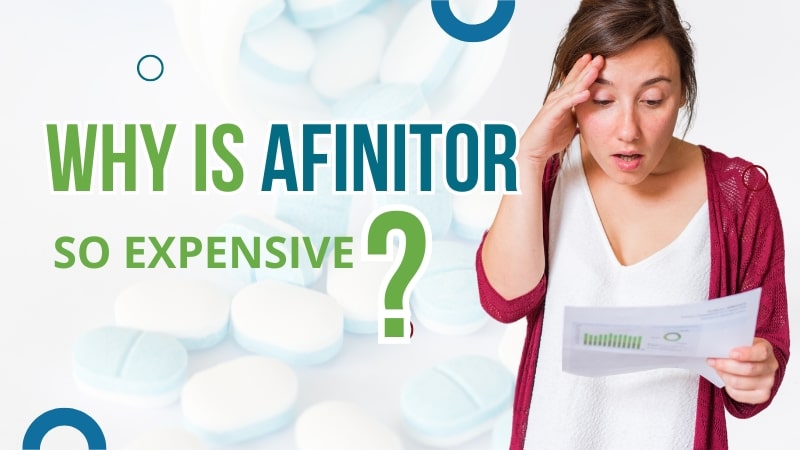Why Is Afinitor So Expensive?
In the realm of cancer treatment, medical advancements have paved the way for targeted therapies that offer hope and improved outcomes for patients. Afinitor, also known by its generic name Everolimus, is a notable player in this field, playing a crucial role in the management of certain types of cancer.
In this blog post, we’ll delve into the details of Afinitor, exploring its mechanism of action, approved indications, and its impact on patient’s lives as the question persists: why is Afinitor so expensive?
How does Afinitor Work?

Afinitor, the brand name for Everolimus, is classified as an mTOR inhibitor. mTOR, or mammalian target of Rapamycin, is a protein that plays a key role in regulating cell growth, proliferation, and survival.
By inhibiting mTOR, Afinitor disrupts these processes, making it an invaluable tool in the fight against certain types of cancer. To understand how Afinitor works, it’s essential to grasp the role of mTOR in cellular processes.
Afinitor’s mechanism of action involves inhibiting mTOR, a protein central to cellular growth and survival. By interfering with the mTOR pathway, Afinitor hinders the uncontrolled cell proliferation characteristic of cancer cells, making it a valuable tool in the treatment of certain types of cancer.
It’s important to note that the use of Afinitor is guided by healthcare professionals, and patients should discuss its potential benefits and side effects with their medical team. It is a well-used medication and hence, answers the question: Why is Afinitor so expensive?
Generic Afinitor:

Generic Afinitor may be available, depending on the region and regulatory approvals. Generic versions are typically introduced once the patent protection for the brand-name drug expires. The availability of generic medications varies by country and is subject to local regulations. The question: Why is Afinitor so expensive? It makes the generic availability more at a much cheaper rate.
If a generic version of Afinitor has been approved and is available, it would likely be marketed under the name “Everolimus“. Generic drugs are designed to have the same active ingredient, strength, dosage form, and route of administration as the brand-name drug.
Additionally, you can inquire about generic versions of Afinitor, as they may be more cost-effective. Always consult with your healthcare provider and pharmacist for the most accurate and personalized information based on your circumstances. MedsEngage Pharmacy sells generic Afinitor. Check out the website for the availability.
How much does Afinitor cost with and without insurance?

The cost of Afinitor (Everolimus) can vary widely depending on several factors, including your location, the specific formulation and dosage prescribed, and whether you have insurance coverage.
Additionally, drug prices are subject to change, and new developments in the pharmaceutical market may impact costs. The average retail price for a one-month supply of Afinitor ranged from $10,000 to $12,000 in the United States.
Hence the question: Why is Afinitor so expensive? However, it’s crucial to note that these figures are approximate, and actual prices can be higher or lower based on various factors.
Afinitor cost With insurance:
– If you have health insurance coverage, your out-of-pocket costs for Afinitor will depend on your specific insurance plan. Insurance plans often cover a portion of the cost, and the amount you pay will be determined by factors such as your co-payment, co-insurance, and deductible.
Afinitor cost without insurance:
If you do not have insurance, you may be responsible for the full retail price of Afinitor. In such cases, exploring patient assistance programs offered by pharmaceutical companies or charitable organizations is advisable, as they may provide financial assistance or discounts for eligible individuals.
Check MedsEngage Pharmacy to save out-of-pocket expenses and get relieved with offers and discounts there and get less frowned upon by asking Why is Afinitor so expensive.
Why Is Afinitor So Expensive?

The high cost of Afinitor (Everolimus) and other similar medications can be attributed to various factors within the pharmaceutical industry and healthcare system.
Here are some reasons why is Afinitor so expensive:
- Research and Development Costs: Developing a new medication, including extensive research, clinical trials, and obtaining regulatory approval, is a costly and time-consuming process. Pharmaceutical companies often factor in these expenses when pricing their drugs.
- Limited Patient Population: Afinitor is often prescribed for specific types of cancer or conditions with a limited patient population. The development and production costs are distributed among a smaller number of patients, potentially leading to higher individual costs.
- Orphan Drug Designation: Afinitor may be designated as an orphan drug for certain indications. Orphan drug status is granted to drugs developed to treat rare diseases or conditions, providing the manufacturer with certain incentives, including extended market exclusivity. However, these incentives may contribute to higher drug prices.
- Complex Manufacturing Processes: Some drugs, including targeted therapies like Afinitor, involve complex manufacturing processes. Ensuring the consistency and quality of the drug can contribute to production costs.
- Patent Protection: When a pharmaceutical company develops a new drug, it is typically granted patent protection, giving it exclusive rights to market the drug for a specified period (usually 20 years). During this time, the company can set higher prices to recoup development costs and generate profits.
- Ongoing Research and Innovation: Pharmaceutical companies continue to invest in ongoing research and development to improve existing medications and discover new treatments. These costs are often factored into the pricing of drugs.
- Regulatory Compliance: Meeting regulatory requirements and maintaining compliance with various health and safety standards contribute to the overall cost of drug development and manufacturing.
- Market Dynamics: Pricing decisions can also be influenced by market dynamics, competition, and negotiations with healthcare payers. The willingness of insurers to cover the drug and negotiate pricing can impact the final cost to patients.
It’s important to note that the pricing of pharmaceuticals is a complex and multifaceted issue. While these factors contribute to the high cost of Afinitor, efforts are ongoing to address concerns related to drug pricing, including the development of generic alternatives, increased competition, and policy discussions on pricing transparency and affordability. And the reduction in the most asked question: Why is Afinitor so expensive?
Patients facing challenges with the cost of Afinitor are encouraged to discuss their situation with their healthcare providers and explore available patient assistance programs or alternative treatment options.
Endnote:
Afinitor represents a groundbreaking development in the landscape of cancer treatment. Its targeted approach, coupled with clinical efficacy, has positioned it as a valuable tool in the armamentarium against various cancers.
As research continues and new data emerges, Afinitor will likely play an increasingly prominent role in the ever-evolving field of oncology, offering hope to patients and their families as they navigate the challenging journey of cancer treatment.
Always consult with healthcare professionals for the most current and personalized information regarding Afinitor and its use in specific clinical scenarios.
FAQs:
Does Afinitor cause hair loss?
No, Afinitor doesn’t cause hair loss.
How long does it take for Afinitor to work?
The treatment is a long course duration and the work of the medicine can be seen after weeks of intake.
Is Afinitor a Chemotherapy?
No, Afinitor is not a chemotherapy.
Can Afinitor cause increased fatigue?
Yes, it can cause fatigue or weakness in the body.
Can Afinitor cure cancer?
No, Afinitor cannot cure cancer but it is a part of the treatment plan to manage and control the growth of certain types of cancer. Hence, it proves the question of why is Afinitor so expensive.

